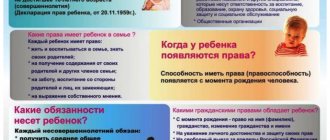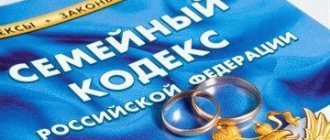The basic responsibilities of a father and mother towards their children are care, concern, education and financial support. To implement them, parents are vested with parental powers, which are protected by law. In the absence of the father and mother, the powers and responsibilities are vested in the adoptive parents or persons who have formalized guardianship. In some cases, the state assumes such responsibilities towards minors.
The situation affecting the rights and responsibilities of minor parents seems difficult. Persons who have not themselves reached the age of majority - eighteen years of age - are vested with responsibilities in relation to the same status as minors - their children.
What branch of jurisprudence regulates the issues and exercise of parental authority?
Mutual obligations within the family to parents and children are legally regulated by the branch of family law . Regulatory acts on family issues are adopted by the bodies of the Russian Federation and its constituent entities. The basic law fixing the obligations of relatives is the Family Code of the Russian Federation (FC RF) dated December 29, 1995, No. 223-FZ.
In addition, federal laws adopted in accordance with it (for example, Federal Law No. 143-FZ “On Acts of Civil Status” dated November 15, 1997), laws of constituent entities, and by-laws can be noted as sources. The rights of the child are regulated by international law (the Convention on the Rights of the Child).
What is the reason for the occurrence?
The reason for the emergence of parental powers and responsibilities is the legally certified origin of the child from a specific mother and father (Article 47 of the RF IC). The procedure for registering the fact of birth is specified in the second chapter of the Federal Law “On Acts of Civil Status”.
The origin of the child is documented:
- birth or adoption certificate;
- entry in the passport of the mother or father;
- court decision.
Methods of establishing by law in the Russian Federation
The most popular way to establish origin is for the mother or father to submit to the registry office an application and a certificate from the maternity hospital where the child was born. However, parenthood is confirmed not only voluntarily.
Maternity is established on the basis:
- documents provided from the medical institution where the birth took place;
- an oral or written statement from a witness if the child was born at home without medical assistance;
- a court decision that has entered into legal force.
Grounds for recognition of paternity:
- the birth of a child in marriage;
- application from a man and woman who were not married before the birth of the child;
- an application to establish paternity from a person who is not married to the child’s mother;
- a court decision that has entered into force.
Important! If a child is born less than 300 days after the divorce or death of the mother’s official husband, the mother’s ex-husband is recognized as the father, unless otherwise proven.
What is the equality of husband and wife?
Article 61 of the Family Code of the Russian Federation explains whether both parents have equal rights. This means that a parent who conscientiously fulfills his responsibilities towards a child cannot be limited in the exercise of his rights on the basis of gender.
The father and mother are equally involved in raising the child , taking care of his health and financially supporting him. Neither parent should shirk their obligations towards their children - for this he may be deprived of parental rights.
Parents have the advantage of raising their own children over other relatives and officials (Part 1 of Article 63 of the RF IC). The only exception can be a situation in which the well-being of the child suffers.
Grounds for recognizing a minor citizen as a parent
An adult in our country is a citizen who has reached the age of 18, which allows him to fully have civil capacity, which entails certain powers and responsibilities.
Attention! The fact of the onset of full civil capacity can be confirmed earlier - during the registration of marriage relations and official employment.
An important event is the birth of children to a father and mother who have not reached adulthood. According to Art. 61 of the Family Code of the Russian Federation, father and mother are equally vested with the same powers in relation to their children and mutually bear equal responsibility for them. Minor parents have the same responsibilities towards their children as those who have reached the age of 18.
This is due to the state’s concern for the interests of not only the young mother and father, but also their children. The list of rights granted to parents who have not reached the age of majority is enshrined in Art. 62 IC RF.
The rights of minor parents and their differences from the rights of adult parents
The exercise of parental rights by minor parents is replete with legal nuances. In this regard, it is recommended to consider parental authority in detail, taking into account the age and legal capacity of young parents.
Parents with the status of minors are persons who are under 18 years of age at the time of the birth of their child. If legal capacity is limited due to their age, the protection of the rights of minor parents is regulated by law.
Based on Art. 62 of the RF IC, a minor mother who is not officially married at the time of the child’s birth is positioned as a child herself, which indicates the limitations of her civil powers. At the same time, the state recognizes her parental powers and responsibilities in relation to her children.
Taking into account the complexity of the regulation of such relations, the state provides special rules in accordance with which the rights of minor parents will be realized. When a mother reaches the age of 16, she is endowed with the ability to independently carry out her parental responsibilities. Otherwise, guardianship of the child by minor parents is assigned to represent his interests, if necessary.
Important! If disagreements arise in matters of upbringing between the child’s mother and the guardian appointed for him, representatives of the guardianship and trusteeship authority are involved to resolve the dispute and make an effective decision.
According to Art. 62 of the RF IC, parents who have not reached the age of majority have the following rights:
- live together with your child;
- actively participate in its development and education;
- having reached the age of 14, establish paternity in relation to him by judicial procedure;
- upon reaching the age of 16 years, independently, without the participation of a guardian and restriction of rights, fulfill their parental responsibilities;
- establish, recognize or challenge paternity or maternity.
If we compare the rights of adult and minor parents, they have differences. The criteria for comparison are:
- age and other conditions;
- the right to personal education of the child;
- the need to appoint a guardian to protect his rights and represent legitimate interests;
- the possibility of living together with him;
- powers to establish, recognize or challenge paternity or maternity.
Young fathers and mothers can be divided into 3 categories:
- Adults – over 18 years of age.
- Minors - under 18, but over 16 years old or officially married.
- Incompetent minors are those under 16 years of age and not officially married.
The right to personal education of children is exercised in the first two categories. The father and mother from the third category, although not endowed with the right of personal upbringing, can take part in it. The need to appoint a guardian to protect rights and represent interests is absent for the first two categories of parents. For the third category, a guardian must be appointed until the mother and father reach the age of 16. The guardian is appointed by the guardianship and trusteeship authority at the place of residence of the young parents.
All three categories have the opportunity to live together with the child, as well as the authority to establish, recognize or challenge paternity or maternity.
Parental obligations: general characteristics
The rights of parents in the part of the parent-child relationship regulated by law stem from the duties established by law. That is, on the one hand, the mother and father undertake responsibilities for development and learning, and on the other hand, they organize the process in the most convenient way for them, taking into account the interests of the child.
Personal non-property
Among the responsibilities not directly related to the maintenance of a child are::
- responsibility for education and development;
- the duty to provide education;
- duty to protect the interests of children.
On the upbringing and implementation of education in relation to their children
Caring for the physical and mental health of the child, his assimilation of knowledge and moral standards is the primary maternal and paternal task. It includes the need for comprehensive education of the individual and the organization of the learning process. Responsibility for raising children Parents must create conditions for the harmonious development of the child.
In addition to obvious things like care and concern for the physical health of a minor, this also includes the formation of his spiritual and moral guidelines, familiarity with the norms of society. Also important are a favorable psychological microclimate within the family, the relationship between father and mother , respect for the child’s personality and recognition of his individuality.
Important! Education using methods of physical or psychological violence is unacceptable. It harms the interests of the minor, creates negative patterns of behavior and negatively affects his development.
Responsibility to provide education Parents provide their child with a level of education not lower than basic general education. They can also, with the consent of both parties, create conditions for further education: secondary general or professional, higher. At the same time, the state guarantees free and accessible education for all categories of citizens.
The child’s legal representatives are not required to apply only to state educational institutions. A minor can study for a fee in any organization that meets educational standards.
Parents have the right to raise their children in accordance with their beliefs , choose the appropriate form of education and educational organization. The child adopts family attitudes, values, traditions and customs.
Legal protection
The mother and father legally represent the interests of the minor child and ensure that his rights are respected. The right of parents to represent the interests of the child In relations with individuals and organizations, parents represent the interests of their children. This also applies to representation in court.
Parents do not need a power of attorney or any other special document - the child’s birth certificate is sufficient. Minors over 14 years of age in some processes can represent their own interests independently within the framework of existing laws. For example, a person who has reached the age of 16 has the right to apply to the court for emancipation.
Important! If it turns out that the interests of the child and his parents come into conflict, the guardianship authority appoints a representative (relative or official) at its discretion.
Advocating for the interests of a son or daughter
Mother and father not only ensure that the rights of the child are respected. In the event of their violation, parents are obliged to defend their children's interests by all legal means, seeking restoration of justice.
Property
The legislation makes financial demands on parents . Mother and father are obliged to support their minor children, but if necessary, they can take advantage of state assistance in the form of benefits and allowances. In some cases, parents inherit the child's property.
Until what age are they required to maintain and provide housing?
Both parents bear joint expenses for the maintenance of the child - this is their statutory obligation. If one of the parents has ceased to allocate funds to ensure a comfortable existence for the child, the court may forcibly recover them. In this case, the mother or father has child support obligations. Even parents who are deprived of the rights to raise children continue to pay child support. Read below about the age at which parents are required to support and provide for their children.
Parents are required to support their minor children until they reach adulthood , and in case of incapacity for work, even after they reach the age of 18. The mother and father, if they perform their duties properly, can receive from the state benefits and other material assistance necessary to ensure the life of the child.
Is there a possibility of inheritance?
If a child dies, the parents inherit his property. If the child was an adult and had a family, the mother and father are the heirs of the first priority, along with the spouse and children of the testator.
Important! Even if the parents are not indicated in the will, but are disabled, they are entitled to a mandatory share of the inherited property. It cannot be less than half of what would be due to them by law.
In some cases, the mother or father may be recognized as an unworthy heir (Article 1117 of the Civil Code of the Russian Federation). A parent will not receive his share of the inheritance if he :
- was a persistent non-payer of alimony;
- was deprived of parental rights;
- committed illegal actions in order to increase the portion of the testator’s property due to him.
Minor mom and dad
Minor parents are authorized to take part in raising a child and live with him (Part 1 of Article 62 of the RF IC). From the moment they reach the age of sixteen, they can exercise their rights fully and independently. Until this time - only together with the guardian (Part 2 of Article 62 of the RF IC).
If disagreements arise between a guardian and a minor parent regarding issues of upbringing, they can turn to the guardianship authorities to resolve the problem.
A minor mother or father can also establish paternity and maternity on a general basis , including through the court, if they are already 14 years old (Part 3 of Article 62 of the RF IC).
Implementation
Parental rights should not conflict with the interests of children. The priority for the mother and father is always the well-being of the child. If powers are exercised to the detriment of the children's welfare, parents are liable under the law.
Mother and father living together
If the mother and father of the child live together, then they make decisions on all issues of development and upbringing together. If disagreements arise, any of the parents can contact the guardianship authority or the court to defend their opinion in a legal way.
A man and a woman live separately
A mother or father living separately still participates in the child’s life , makes decisions on parenting issues, and, if necessary, represents interests in court or other organizations. The other parent cannot interfere with the exercise of parental authority. An exception is failure to fulfill the duties of education and maintenance.
Minors and/or incapacitated
From the age of sixteen, young parents independently protect the interests of their child. Before that, with the help of a guardian. At the same time, they have the right to live together with the child. If the mother or father is declared incompetent by a court decision, they can also exercise part of their powers, taking into account the severity of the condition, only together with the guardian.
Parents' rights
Parents are the primary persons responsible for raising a child. Parental privileges are vested in either the biological mother and father or the adoptive parent.
Biological mother and father have equal rights and responsibilities and these include:
- to raise a child;
- state benefits and cash benefits if the family has many children, is low-income, or the child has a disability;
- choose a preschool and school educational institution;
- represent the interests of the child before individuals and legal entities;
- if the parents are minors, then they have the primary right to participate in the upbringing of the child and to live together with him;
- A mother or father living separately has the right to have contact with the baby and receive certain information about him from various specialized institutions.
A father who doubts the relationship with the baby has the right to conduct a DNA test to confirm paternity. Also, the mother and father can freely give the child his full name or change his first and last name if necessary. The place of residence of a minor citizen is chosen similarly by mutual agreement of the persons raising him. The above rights are vested in those parents who have not been subject to restrictions or deprivations in court.
Family relationships with grandparents and others
Do grandparents and other relatives (brothers, sisters) have the right to communicate with a minor child and which ones exactly can you find out in Art. 67 RF IC. Parents should not interfere with relationships if they do not harm the interests of the children. If the mother or father interferes with the child’s communication with relatives, the injured party can complain to the guardianship authority, and then, if the measures taken do not help, to the court.
Reference . At the end of November 2020, a bill supplementing the Family Code was proposed for consideration by the United Russia faction. It provides for the right of relatives to participate in the upbringing of minor children.
What rights of children are determined by legislative documents?
The law reserves the following groups of rights for minors::
- personal;
- property
For children under the age of eighteen, there are no statutory obligations towards older relatives. Obligations are established individually in each family and are not subject to regulation unless they violate the law.
Personal
This category of rights is not associated with the receipt of material benefits. These include:
- the child’s right to be raised in a family;
- the right to communicate with mother, father and other relatives;
- the right to upbringing and education;
- right to a name and its change.
The implementation and observance of these rights is guaranteed by parents or guardians, and in their absence, by the state represented by the guardianship and trusteeship authorities.
Growing up in a family
Until a child is 18 years old, he has the right to be raised by his parents and live together with them, if his interests do not suffer from this (Article 54 of the RF IC). Father and mother must respect the child and see him as a separate person , take care of his health, ensure his interests and development.
Important! In the absence of parents, the possibility of raising a minor in a family is ensured by the state represented by the guardianship authorities.
A child has the right to know the identity of his biological parents (mother and father), even if he was abandoned, and also if paternity or maternity was established in court. However, there are two exceptions to this rule:
- if the birth was carried out using donor materials (this also includes the services of a surrogate mother);
- if the secrecy of adoption is maintained.
Communication
A child can communicate not only with his mother and father, but also, if desired, maintain relationships with other relatives: brothers and sisters, grandparents (Article 55 of the RF IC). He retains this right even during arrest or detention, in hospital and under other extreme circumstances.
Communication means not only personal meetings, but also telephone and video calls, messages in instant messengers, social networks, and email correspondence.
For education, development
The law establishes the responsibility of parents to raise children (Article 63 of the Family Code). Diverse personality development includes four main aspects :
- physical;
- mental;
- moral;
- spiritual.
Children have the right to receive general education . Parents providing this opportunity choose a form of educational process, an organization that provides educational services taking into account the interests and needs of the child.
Important! The upbringing process should not cause damage to physical and mental health. Otherwise, parents may be held liable.
Freely express your opinion
The opinion of children must be taken into account when discussing any issue that in one way or another affects their interests (Article 57 of the RF IC). This applies not only to the family, but also to the court, guardianship authorities, and potential adoptive parents.
There is a difference between agreement and consideration of opinion. In the first case, the minor’s position on key issues (name change, adoption, etc.) is necessarily taken into account. In the second, the competent authority may make a decision that differs from the child’s opinion.
Obtaining the consent of a child who has reached the age of ten is in some cases a mandatory procedure. Without it, it is impossible to change the name and surname of a minor, adopt him or place him under guardianship, or restore a parent with limited rights.
Advocacy
The state ensures the protection of the rights and legitimate interests of the child by law (Article 56 of the RF IC). Compliance is also guaranteed by parents or legal representatives, guardianship authorities, the prosecutor's office and the court. A minor citizen who has married or undergone the emancipation procedure can protect his interests independently.
The right to protection also includes ensuring safety and proper performance of duties on the part of parents or persons replacing them. A child over 14 years of age can sue a mother, father or guardian who abuses their authority and ignores obligations.
Important! A citizen or official who learns about a threat to the well-being of a child is obliged to report this fact to the guardianship authority. Employees must carefully review all information received.
Full name and changing it
In accordance with the law, a minor has the right to his own name, surname, patronymic (Articles 58, 59 of the RF IC).
- The name is chosen jointly by the mother and father . It may not contain numbers, symbols, profanities, titles or positions. A child may wish to change his name after his fourteenth birthday.
- The patronymic is usually derived from the father's given name . In case of unknown paternity - on behalf of the person recorded in the corresponding column of the birth certificate. The law provides for the possibility of forming a patronymic in accordance with national traditions.
- The surname is determined by the parent or is indicated by agreement of the father and mother . It should consist of no more than two words connected by a hyphen.
When changing the surname or first name of children who have reached the age of ten, their consent is required. Personal data cannot be changed without consent (Article 59 of the RF IC).
Receiving material benefits and inheritance
The property rights of children are regulated not only by family law, but also by civil and housing legislation (Article 60 of the Family Code) and include:
- Right to content .
Provided by parents, and if they are absent, by guardians or close relatives (grandparents, adult brothers and sisters). Parents have an equal responsibility to support the child. It does not depend on age, work or capacity. If one of the parents evades obligations, the court can collect money from him for the maintenance of the child - alimony. - The right to dispose of property and income. The breadth of powers depends on the age of the minor.
- Children from 6 to 14 years old can make small household transactions or transactions that only imply the receipt of benefits in their favor; receive pocket money from legal representatives.
- Children from 14 to 18 years old manage their own fees, stipends, earnings and exercise copyrights, make deposits and carry out transactions with the consent of their parents or guardians.
- The right to inherit parents' property .
Doesn't depend on age. A minor child, along with other relatives, has the right to an equal share in the inheritance after the death of his father or mother. However, for children the law provides a number of additional guarantees. For example, if the heir has not yet been born, the division of property can be carried out only after his birth and taking into account his interests. In addition, minors receive a part of the deceased parent's inheritance, even if they were not mentioned in the will (and this share cannot be less than half of what would be due in case of inheritance by law).
Important! Even the mother and father cannot dispose of the child’s property without his consent. Children also cannot use their parents' property without their permission. And things for shared use are used by agreement.
Adults
From the moment of adulthood or emancipation, a child acquires the full range of rights and responsibilities of an adult . At the same time, the period for fulfilling the parental responsibilities provided for him ends. Now they are not required by law to support him (exception is incapacity for work, disability of the child).
On the other hand, the adult offspring now independently carries out any transactions, gets married, and manages his own property.
Maintenance of mother and father
The obligation of able-bodied children to take care of parents who are in a helpless state is enshrined in Part 3 of Art. 38 of the Russian Constitution and Art. 87 Family Code.
If the mother or father is unable to support themselves and needs help, an agreement on the payment of alimony is concluded between them and the children. In the absence of a document regulating payments, alimony is collected in court . The court may take into account the wealth of the parents and each of their children.
Important! If the parents were previously deprived of their rights and did not appeal this decision, and also avoided fulfilling their obligations, then their adult children will be exempt from paying maintenance (Part 5 of Article 87 of the RF IC).
Principle of equality
Article 61 of the RF IC enshrines the principle of equality, without making distinctions based on gender. Mother and father do not differ in their parental rights and responsibilities. They can equally raise their heirs, provided that each does so conscientiously and responsibly.
Status and financial situation, profession and faith do not play a role. It doesn’t matter whether the mother and father are married, divorced, or their relationship is not formalized. The main thing is that paternity and maternity are registered with the civil registry office, even if paternity is established by a court decision.
Important ! The parental rights of the father and mother arise from the moment of birth and terminate when the child becomes an adult or is recognized as having legal capacity in the event of emancipation or marriage before the age of 18.
If you are left orphans
Children deprived of the care of relatives retain the entire range of rights and guarantees, only the state, represented by the guardianship authorities, ensures their observance. By realizing the child’s right to be raised in a family, the guardianship authority seeks to provide him with the opportunity to live in a foster family or under guardianship.
If placement in a family is impossible, the child is placed in an institution for orphans for some time. When adopting, the native language of the minor, his cultural, national, and religious affiliation must be taken into account.
Special cases
Special circumstances do not deprive a child of his rights under the law, even in the event of divorce or death of the parents.
After the death of a spouse
Since the law establishes the joint responsibility of the father and mother, upon the death of one of the parents, the second assumes obligations for the maintenance and upbringing of children . At the same time, the surviving parent has the right to receive assistance from the state, including material and psychological.
In case of divorce and if the marriage is not registered
Parents who are not officially married have the same rights and bear the same responsibilities in relation to their children as if they were married (Article 53 of the RF IC).
Divorce should not affect the provision of the rights of the child, as well as the separation of mother and father (including in different countries).
In case of divorce, the child’s place of residence is determined by agreement of the mother and father. In some cases, a court order is required.
When considering the issue of the place of residence of a minor, the court must take into account his opinion. If the child is over ten years old, then his consent is a mandatory condition when determining the place of residence.
How to obtain rights for a child under 18 years of age
The rights and responsibilities of minor parents change significantly if they are officially married. In this case, a person under 18 years of age is declared emancipated, that is, he acquires full legal capacity and can exercise all civil rights and bear responsibilities. To declare a citizen emancipated, the following conditions are necessary:
- Age from 16 years.
- Officially registered marriage union (work under an employment contract).
If the conditions are met, it is necessary to collect supporting documents and submit a corresponding application to the local government authority. If the decision is positive, the citizen will receive a decree declaring him emancipated. This document will allow the minor parent to exercise his rights in full.
Important! Mom and dad receive not only rights, but also responsibilities in relation to the child. The financial support of the child rests entirely on their shoulders.
Violation and defense
The rights of parents are protected by the court . The mother and father can demand the return of the child if he is being unlawfully detained by another person. However, when considering such a claim, the court will proceed from the interests of the minor, assessing whether the parents are capable of raising and raising him properly.
If the judge has reasonable doubts, he can refuse to satisfy the claim, leaving the child with a person caring for him, or transfer him to the guardianship authorities.
Who are minor parents?
Minor parents are persons under 18 years of age who have children of their own. The rights of such parents are regulated by:
- Family Code;
- Law No. 48 “On guardianship and trusteeship”;
- Civil Code.
Art. 62 of the RF IC regulates the rights of parents under 18 years of age, and Chapter 2 of Law No. 48 defines the tasks of the guardianship service to monitor families with minor parents in order to protect the rights of parents and their children.
The right of minor parents to fulfill their duties in full (emancipation) upon reaching 16 years of age is determined by Art. 27 Civil Code of the Russian Federation.
Deprivation
The parental rights of a father or mother can be deprived only through the court. In this case, the child is transferred to the second parent, and if impossible, to other relatives or guardianship authorities. A parent who is deprived of parental rights is still required to support the child, but loses the right to any benefits and allowances associated with it, as well as the right to child support.
Grounds for deprivation of parental rights:
- evasion of duties (including failure to pay alimony);
- alcohol or drug addiction;
- committing a crime against the life and health of children or other family members;
- physical, mental, sexual violence against a child;
- abuse of power;
- refusal to pick up a child from a hospital, maternity hospital or other organization without a good reason.
Agreement on the exercise of parental rights
This agreement is most typical for cases where one of the parents lives separately from the child for personal reasons, for example, the parents are divorced, he has another family, or due to the nature of his work he cannot live with his child.
Such an agreement can be drawn up voluntarily (if both parents have the same point of view on raising a child and communicating with him) or determined by a court decision.
In cases where we are talking about the voluntary signing of an agreement, it must be certified by a notary so that in the future, even if disputes arise regarding the mode of exercise of their rights by parents, the previously established procedure can be confirmed by a legally significant document.
An agreement on the exercise of parental rights is drawn up in the form of a written document, which must reflect the following provisions:
- date and place of conclusion of the agreement;
- the parties who signed it (both parents, living and not living with the child);
- information about the child in respect of whom this agreement is signed;
- a list of rights that must be exercised in accordance with the terms of the agreement;
- a list of rights that must be exercised regardless of the provisions of the signed agreement;
- the procedure for exercising all listed rights;
- sanctions for improper performance of duties;
- signatures of the parties;
- information about the notary who certified the agreement, his signature and seal.
You can download the agreement on the exercise of parental rights here.
In some cases, information about the validity period of the signed agreement is indicated, but, as a rule, it loses its legal force when the child comes of age.
Limitation
If the grounds for deprivation of rights are insufficient, and the interests of the child are systematically violated, the guardianship authority may impose penalties on the mother or father, consisting of taking away the child and limiting parental authority. However, contact with the parent is allowed if it does not cause harm.
A mother or father who has limited rights loses the opportunity for personal upbringing and receiving benefits or benefits from the state. However, they retain the responsibility to provide financial support for their children.
Possibility of recovery
If the deprived father or mother has reconsidered their habits and lifestyle, they can file an application with the court for restoration of their rights and a demand for the return of the child. The court makes a decision taking into account the interests, needs and opinions of the child (and for children over 10 years old - only with their consent). Restoring the previous status is impossible after the adoption of a minor .
Parents protect the interests of the child, ensure compliance with and prevent violations of his rights. Mother and father are obliged to support, raise and educate minor children. In case of systematic neglect of their responsibilities, parents may be held accountable, including by limiting or depriving parental authority.
List of parental rights
The Family Code of the Russian Federation has defined the list of rights of parents in relation to their children as follows:
- the right to educate and raise their children (for parents this right has priority over other people and is personal);
- the right to educate their children (this right is directly related to the obligation to provide the child with a quality education, and also means the opportunity for parents to choose the form and methods of educating their child, including by choosing the appropriate educational organization. The Family Code also refers to this right as a personal right parents' rights);
- the right to protect the interests of their child is also assigned by the legislator to the parents, except in cases where the guardianship and trusteeship authorities have imposed restrictions on the parents in their rights or have completely deprived them of parental rights in relation to a particular child;
- the right to take care of the moral and physical condition of the child, as well as his mental and physical health;
- the right to reclaim your child from third parties whose presence of the child is not related to the court decision;
- for parents living separately - the right to communicate with the child at the time he wishes (except for cases where such communication may harm the mental, physical or emotional state of the child);
- the right of inheritance for a child can be exercised only in relation to those parents to whom measures have not been taken to limit or deprive parental rights.
All rights that parents have belong equally to both of them, except for those moments when the parent is limited or deprived of his rights.
If the parents live separately and the child is physically unable to be with both of them constantly, the regime for exercising their rights can be established through a special agreement.






